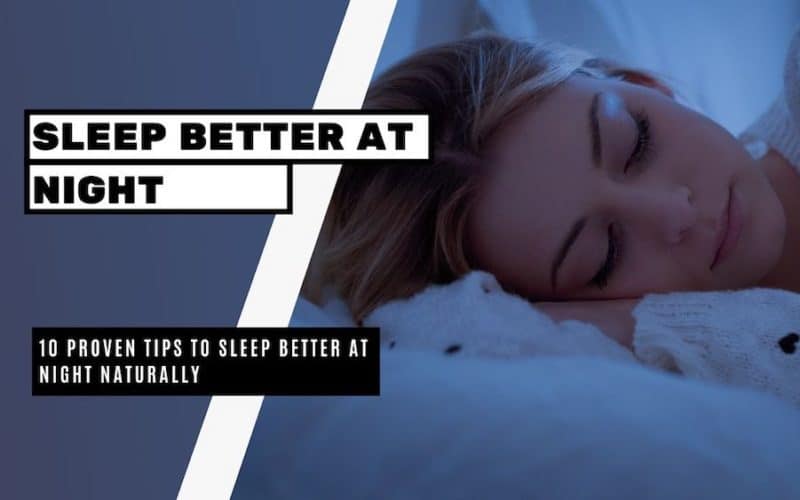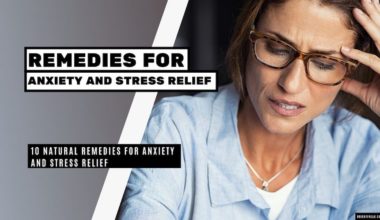Lake of sleep has several effects on our mind, mood, and body. It might cause you memory loss, frequent illnesses, lashing out, irritability and weight gain. So, it is super important to make sure that we are getting enough sleep every night. Therefore, in this article, we will discuss ten proven tips to sleep better at night naturally.
Those who are sleep deprived might notice that they have trouble reading up close. This is due to “tired” eye muscles, such as the ciliary and extraocular, which control eye movement and focus. So, it is important to make sure that we are sleeping better and sufficient at night.
Before we get into how to sleep better every night, let’s take a look at how much sleep we should regularly be getting. First, adults need between seven to nine hours of solid uninterrupted sleep per night.
The average adult, however, usually only gets around six hours of sleep. Does the extra hour make that much of a difference? Actually, yes, it does. Now, let’s look at ten tips to sleep better every night.
Proven Tips to Sleep Better at Night Naturally:
1. Avoid caffeine and alcohol
As tempting as it may be to drink a cup of coffee while you are up to keep yourself stimulated, you absolutely should avoid it if you want to sleep better and faster at night.
Caffeine hurts the deep restorative sleep that comes during the REM (rapid eye movement) and dream stages of sleep. Caffeine and alcohol both are responsible for sleep deprivation which has a different kind of impact on the body.
Harvard medical research has found that sleep deprivation leads to high blood pressure, memory issues, and poor concentration. On the job, injuries increase among people who are sleep deprived, as do vehicular accidents. Additionally, your skin begins to look aged and tired, and you are likely to gain weight.
2. Stay away from “one more peek at your tablet or phone”
Many of us, fall on this bedtime mistakes that make us gain weight at night. One or two hours before you climb into bed, turn the electronics off. Electronic screens can trick your brain into thinking it is earlier than it is, making it harder to fall asleep.
This is one of the reason which causes sleeping problems for many of us. We should not lose our sleep hours as sleep loss has several weight gain consequences.
First, the body’s metabolism slows down when you are sleep deprived (1). Secondly, when you are tired, there is an overproduction of a hormone called ghrelin, which is responsible for making you feel hungry (2).
Lake of enough sleep will make people consume foods that are high in sugar and carbs for an instant energy boost. When the initial energy rush wears off, they will be as tired as they were before eating, and will again reach for sugars and carbs; it’s a cycle designed to make you gain weight.
3. Flip your alarm clock around
That little devil is not only giving off sleep-disturbing light, it is also responsible for added stress. You already know that you will be getting a limited amount of sleep, but if you can see what time it is, you are adding to your sleep anxiety. So, tips to sleep are that once you turn in, don’t recheck the time until your alarm wakes you in the morning.
4. Go to the bathroom in the dark
This is another valuable advice for sleep better and faster at night. Avoid flipping on lights to go to the bathroom if you wake at night to keep your brain in “sleep” mode.
If you are not getting enough sleep, your body will force you to in episodes called micro-sleep. Your body will shut down for tiny naps, for up to several seconds at a time. These can occur anytime and anywhere, no matter what you are doing, including driving a car.
5. Cool off your bedroom
According to the National Sleep Foundation, The perfect sleeping temperature is between 60 to 67 degrees Fahrenheit or 15.5 to 19 degrees Celsius. In order to fall asleep faster and sleep better at night, cool off your bedroom before turning in.
As sleep restores the mind and body strength. Your body needs the downtime to repair itself and build muscle tissue, as well as to balance hormones. Your brain needs enough and better sleep to process and store information. You may think that your mind and body are at rest, but in reality, both are quite busy during sleep. So, make sure you have a friendly room temperature for good sleep.
6. Stay away from over the counter sleep aids
Sleep aids are designed to give you a solid night’s sleep, but if you are getting less than 7-9 hours of sleep, stay away from them. Most of the over the counter sleep aids are simply relabeled Benedryl (diphenhydramine) and will leave you feeling groggy in the morning.
7. Don’t hit the snooze button
It is tempting to reset your alarm to get a few extra minutes of sleep in the morning, but it isn’t worth it in the long run. Get up at the time you usually would and follow your routine as carefully as you can.
You will already be groggy and moving slowly, so time spent squeezing in fifteen extra minutes of sleep will be time better spent getting ready for your morning obligations.
8. Use earplugs for a deep sleep
If your neighborhood or surrounding is being rambunctiously loud; then it usually hard to sleeps better through it. So, you need to shut out any distractions that will keep you from getting a night of better sleep.
Using earplugs can be a good solution to block the disturbance. Initially, earplugs might be a little irritating but in the long run, you will love it.
9. Factor in your sleep cycles
According to a study, The average adult has ninety-minute sleep cycles. You will be more rested if you can set your alarm to coincide with these sleep cycles, waking you at the end of one rather than in the middle of it. Add about ten to twenty minutes to fall asleep, and you may be better off setting your alarm for around 5:45 am instead of six.
10. Consider an electro sleep device
If you make it a habit of staying up later, you may want to invest in an electro sleep device. Cranio-Electro Therapy Stimulation (CES) helps you achieve a better, more restful night’s sleep. Invented in 1949, CES is a safe way to lull your brain into a deeper sleep, making each of your sleep hours count more.
With these ten proven pieces of advice to help you get enough and better sleep every night, you can turn just a few hours’ sleep into a good morning. Also, if you have snoring issues that cause sleep deprivation then you should contact your doctor for snoring remedies.





